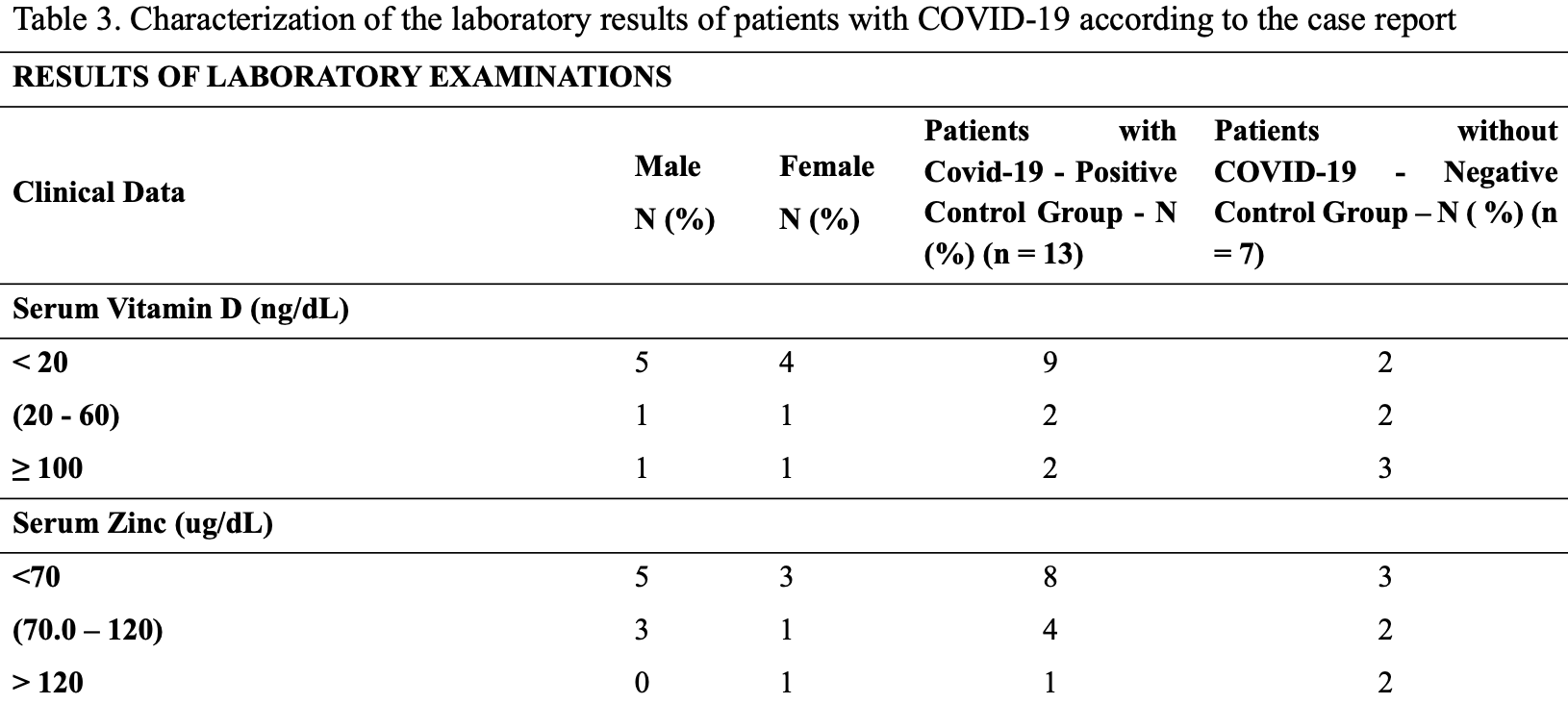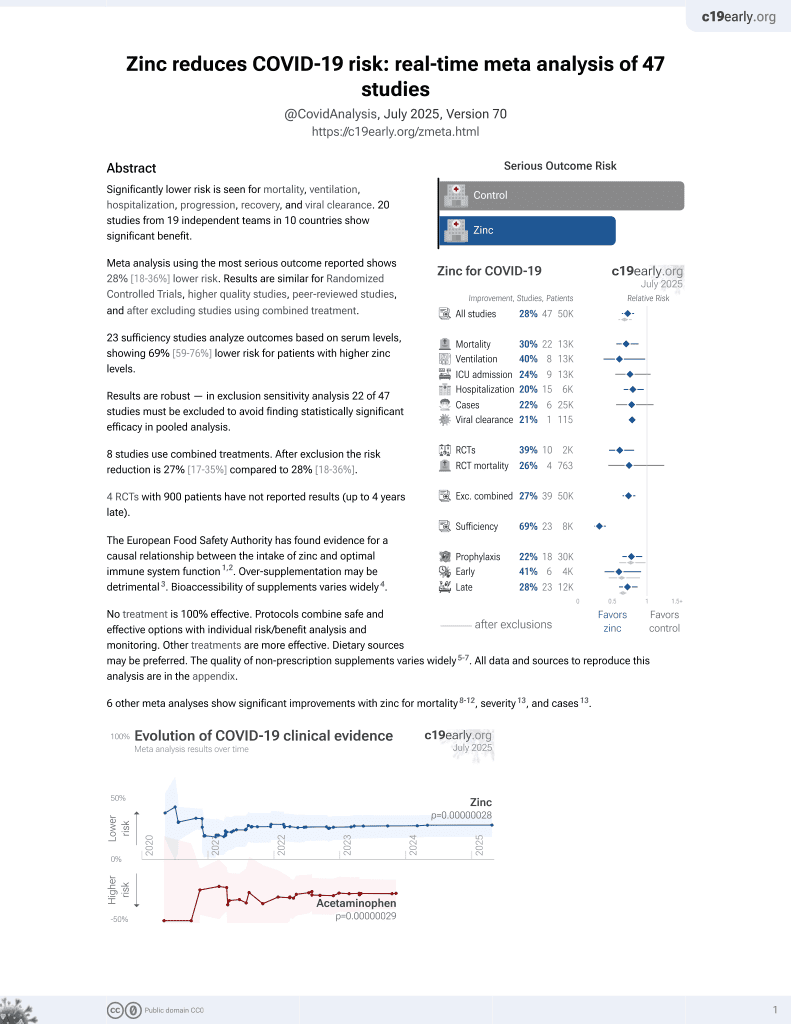
Vitamin D, Zinc and Iron in Adult Patients with Covid-19 and Their Action in the Immune Response as Biomarkers
et al., Global Journal of Health Science, doi:10.5539/gjhs.v14n1p1, Nov 2021
Zinc for COVID-19
2nd treatment shown to reduce risk in
July 2020, now with p = 0.00000028 from 47 studies, recognized in 23 countries.
No treatment is 100% effective. Protocols
combine treatments.
6,400+ studies for
210+ treatments. c19early.org
|
Retrospective 13 COVID-19 patients and 7 controls in Brazil, showing no significant difference in zinc deficiency.
Study covers vitamin D and zinc.
|
risk of case, 23.6% lower, RR 0.76, p = 0.64, high zinc levels (≥70μg/dL) 5 of 9 (55.6%), low zinc levels (<70μg/dL) 8 of 11 (72.7%), NNT 5.8.
|
| Effect extraction follows pre-specified rules prioritizing more serious outcomes. Submit updates |
Ramos et al., 15 Nov 2021, retrospective, Brazil, peer-reviewed, 11 authors.
Vitamin D, Zinc and Iron in Adult Patients with Covid-19 and Their Action in the Immune Response as Biomarkers
Global Journal of Health Science, doi:10.5539/gjhs.v14n1p1
COVID-19 in 2020 brought challenges to the Brazilian public health system with an emerging virus with respiratory contagion called SARS-CoV-2. There are few studies in Brazil and in some countries, on the increased incidence of certain viral respiratory infections, including H1N1 and coronavirus and their association with low levels of vitamin D, zinc and iron. The aim of this study was to demonstrate that the deficit of vitamin D, zinc and iron has an impact on the infectious process of patients with COVID-19 and to establish new forms of prevention for the worsening of COVID-19 in the human body. Data were collected from medical records and test results from patients being followed up during the treatment period for COVID-19. Patients with low blood levels of vitamin D, zinc and iron during the treatment period of COVID-19 had a higher percentage of worsening and complications requiring hospitalization in intensive care beds. The ingestion of vitamin D, zinc and iron in the treatment period of patients with COVID-19 in addition to being an immunological protector against SARS-CoV-2 and alleviating the process of worsening the disease can also act as a biomarker in cases of this disease.
Author Contributions Conceituação: E.M.R. and V.A.N.; concepção e síntese de compostos, E.M.R. and V.A.
Sample Availability Samples of the compounds are available from the authors.
Competing Interests Statement The authors declare that there are no competing or potential conflicts of interest.
References
Alves, Martins, Adolphsson, Bockorny, Carleti et al., Severe imported malaria: case report, Revista Brasileira de terapia intensiva, doi:10.1590/S0103-507X2007000200016
Ampawong, Chaisri, Viriyavejakul, Prapansilp, Grau et al., A potential role for interleukin-33 and γ-epithelium sodium channel in the pathogenesis of human malaria associated lung injury, Malaria journal, doi:10.1186/s12936-015-0922-x
Andrade, Reis-Filho, Barros, Souza-Neto, Nogueira et al., Towards a precise test for malaria diagnosis in the Brazilian Amazon: comparison among field microscopy, a rapid diagnostic test, nested PCR, and a computational expert system based on artificial neural networks, Malaria journal, doi:10.1186/1475-2875
Anstey, Jacups, Cain, Pearson, Ziesing et al., Pulmonary manifestations of uncomplicated falciparum and vivax malaria: cough, small airways obstruction, impaired gas transfer, and increased pulmonary phagocytic activity, The Journal of infectious diseases, doi:10.1086/339885
Brenner, Holleczek, Schöttker, Vitamin D insufficiency and deficiency and mortality from respiratory diseases in a cohort of older adults: potential for limiting the death toll during and beyond the COVID-19 pandemic?, Nutrients, doi:10.3390/nu12082488
Castro, Silva-Nunes, Conde, Muniz, Cardoso, Anemia and iron deficiency among schoolchildren in the Western Brazilian Amazon: prevalence and associated factors, Cadernos de saude publica, doi:10.1590/S0102-311X2011000100014
Cen, Chen, Shen, Zhang, Lei et al., Risk factors for disease progression in patients with mild to moderate coronavirus disease 2019-a multi-centre observational study, Clinical Microbiology and Infection, doi:10.1016/j.cmi.2020.05.041
Chan, Yuan, Kok, To, Chu et al., A familial cluster of pneumonia associated with the 2019 novel coronavirus indicating person-to-person transmission: a study of a family cluster, The lancet
Cooper, Crofts, Dinicolantonio, Malhotra, Elliott et al., Relationships between hyperinsulinaemia, magnesium, vitamin D, thrombosis and COVID-19: rationale for clinical management, Open Heart, doi:10.1136/openhrt-2020-001356
D'avolio, Avataneo, Manca, Cusato, De Nicolò et al., 25-Hydroxyvitamin D concentrations are lower in patients with positive PCR for SARS-CoV-2, Nutrients, doi:10.3390/nu12051359
Fawzi, Villamor, Msamanga, Antelman, Aboud et al., Trial of zinc supplements in relation to pregnancy outcomes, hematologic indicators, and T cell counts among HIV-1-infected women in Tanzania, The American journal of clinical nutrition, doi:10.1093/ajcn/81.1.161
Giacomelli, Ridolfo, Milazzo, Oreni, Bernacchia et al., 30-day mortality in patients hospitalized with COVID-19 during the first wave of the Italian epidemic: a prospective cohort study, Pharmacological research, doi:10.1016/j.phrs.2020.104931
Gladwin, Kato, Hemolysis-associated hypercoagulability in sickle cell disease: the plot (and blood) thickens!, Haematologica, doi:10.3324/haematol.12318
Grant, Lahore, Mcdonnell, Baggerly, French et al., Evidence that vitamin D supplementation could reduce risk of influenza and COVID-19 infections and deaths, Nutrients, doi:10.3390/nu12040988
Gruber-Bzura, Vitamin D and influenza-prevention or therapy?, International journal of molecular sciences, doi:10.3390/ijms19082419
Huang, Tu, Wang, Chen, Zhou et al., Clinical characteristics of laboratory confirmed positive cases of SARS-CoV-2 infection in Wuhan, China: A retrospective single center analysis, Travel medicine and infectious disease, doi:10.1016/j.tmaid.2020.101606
Jin, Lee, Kim, The prevalence of vitamin D deficiency in iron-deficient and normal children under the age of 24 months, Blood research, doi:10.5045/br.2013.48.1.40
Malek Mahdavi, A brief review of interplay between vitamin D and angiotensin-converting enzyme 2: Implications for a potential treatment for COVID-19, Reviews in Medical Virology, doi:10.1002/rmv.2119
Mohammad, Mishra, Ashraf, Emerging role of vitamin D and its associated molecules in pathways related to pathogenesis of thrombosis, Biomolecules, doi:10.3390/biom9110649
Opas, Folha informativa -COVID-19 (doença causada pelo novo coronavírus
Prasad, Bao, Beck, Sarkar, Zinc-suppressed inflammatory cytokines by induction of A20-mediated inhibition of nuclear factor-κB, Nutrition, doi:10.1016/j.nut.2010.08.010
Prasad, Zinc: mechanisms of host defense, The Journal of nutrition, doi:10.1093/jn/137.5.1345
Ramos, De Abreu, De Freitas, De Lima, Reis et al., COVID-19, rate of case factors and nutritional characteristics of patients dying in Italy and Brazil: a critical analyze, Global J Health Sci, doi:10.5539/gjhs.v12n7p133
Ramos, Mendes Dos Reis, De Souza, De Freitas, De Lima et al., Does Vitamin D Supplementation have a Positive and Important Response in the Immune System on Covid-19 Pandemic? A Short Critical Analysis, International Journal, doi:10.15640/ijmp.v8n1a5
Ramos, Mendes Dos Reis, Ramos, De Souza, Bochenek, Vitamin D produce antibodies in pandemic response to gripal viruses? A critical analysis, Int J Clin Virol, doi:10.29328/journal.ijcv.1001010
Razzaque, COVID-19 pandemic: can maintaining optimal zinc balance enhance host resistance?, The Tohoku journal of experimental medicine, doi:10.1620/tjem.251.175
Read, Obeid, Ahlenstiel, Ahlenstiel, The role of zinc in antiviral immunity, Advances in nutrition, doi:10.1093/advances/nmz013
Xu, Huang, Zhu, Wang, Cheng et al., Epidemiological and clinical features of asymptomatic patients with SARS-CoV-2 infection, Journal of medical virology, doi:10.1002/jmv.25944
Zhou, Yu, Du, Fan, Liu et al., Clinical course and risk factors for mortality of adult inpatients with COVID-19 in Wuhan, China: a retrospective cohort study, The lancet, doi:10.1016/S0140-6736
DOI record:
{
"DOI": "10.5539/gjhs.v14n1p1",
"ISSN": [
"1916-9744",
"1916-9736"
],
"URL": "http://dx.doi.org/10.5539/gjhs.v14n1p1",
"abstract": "<jats:p>COVID-19 in 2020 brought challenges to the Brazilian public health system with an emerging virus with respiratory contagion called SARS-CoV-2. There are few studies in Brazil and in some countries, on the increased incidence of certain viral respiratory infections, including H1N1 and coronavirus and their association with low levels of vitamin D, zinc and iron. The aim of this study was to demonstrate that the deficit of vitamin D, zinc and iron has an impact on the infectious process of patients with COVID-19 and to establish new forms of prevention for the worsening of COVID-19 in the human body. Data were collected from medical records and test results from patients being followed up during the treatment period for COVID-19. Patients with low blood levels of vitamin D, zinc and iron during the treatment period of COVID-19 had a higher percentage of worsening and complications requiring hospitalization in intensive care beds. The ingestion of vitamin D, zinc and iron in the treatment period of patients with COVID-19 in addition to being an immunological protector against SARS-CoV-2 and alleviating the process of worsening the disease can also act as a biomarker in cases of this disease.</jats:p>",
"author": [
{
"affiliation": [],
"family": "Ramos",
"given": "Eliza Miranda",
"sequence": "first"
},
{
"affiliation": [],
"family": "Lima Araújo",
"given": "Emerson Luiz",
"sequence": "additional"
},
{
"affiliation": [],
"family": "dos Reis",
"given": "Francisco José Mendes",
"sequence": "additional"
},
{
"affiliation": [],
"family": "de Souza",
"given": "Igor Domingos",
"sequence": "additional"
},
{
"affiliation": [],
"family": "Facco",
"given": "Gilberto Gonçalves",
"sequence": "additional"
},
{
"affiliation": [],
"family": "Ramos",
"given": "Iara Barbosa",
"sequence": "additional"
},
{
"affiliation": [],
"family": "Miranda Teodoro",
"given": "Pamella Aline",
"sequence": "additional"
},
{
"affiliation": [],
"family": "de Abreu",
"given": "Antônio Carlos",
"sequence": "additional"
},
{
"affiliation": [],
"family": "da Fonseca",
"given": "Alessandro Carvalho",
"sequence": "additional"
},
{
"affiliation": [],
"family": "da Fonseca Junior",
"given": "Ernani Mendes",
"sequence": "additional"
},
{
"affiliation": [],
"family": "do Nascimento",
"given": "Valter Aragão",
"sequence": "additional"
}
],
"container-title": [
"Global Journal of Health Science"
],
"content-domain": {
"crossmark-restriction": false,
"domain": []
},
"created": {
"date-parts": [
[
2021,
11,
16
]
],
"date-time": "2021-11-16T12:27:20Z",
"timestamp": 1637065640000
},
"deposited": {
"date-parts": [
[
2021,
12,
6
]
],
"date-time": "2021-12-06T08:49:33Z",
"timestamp": 1638780573000
},
"indexed": {
"date-parts": [
[
2022,
3,
30
]
],
"date-time": "2022-03-30T22:55:22Z",
"timestamp": 1648680922540
},
"is-referenced-by-count": 0,
"issn-type": [
{
"type": "electronic",
"value": "1916-9744"
},
{
"type": "print",
"value": "1916-9736"
}
],
"issue": "1",
"issued": {
"date-parts": [
[
2021,
11,
15
]
]
},
"journal-issue": {
"issue": "1",
"published-online": {
"date-parts": [
[
2021,
12,
6
]
]
}
},
"license": [
{
"URL": "https://creativecommons.org/licenses/by/4.0",
"content-version": "unspecified",
"delay-in-days": 0,
"start": {
"date-parts": [
[
2021,
11,
15
]
],
"date-time": "2021-11-15T00:00:00Z",
"timestamp": 1636934400000
}
}
],
"link": [
{
"URL": "https://ccsenet.org/journal/index.php/gjhs/article/download/0/0/46298/49565",
"content-type": "application/pdf",
"content-version": "vor",
"intended-application": "text-mining"
},
{
"URL": "https://ccsenet.org/journal/index.php/gjhs/article/download/0/0/46298/49565",
"content-type": "unspecified",
"content-version": "vor",
"intended-application": "similarity-checking"
}
],
"member": "3486",
"original-title": [],
"page": "1",
"prefix": "10.5539",
"published": {
"date-parts": [
[
2021,
11,
15
]
]
},
"published-online": {
"date-parts": [
[
2021,
11,
15
]
]
},
"publisher": "Canadian Center of Science and Education",
"reference-count": 0,
"references-count": 0,
"relation": {},
"resource": {
"primary": {
"URL": "https://ccsenet.org/journal/index.php/gjhs/article/view/0/46298"
}
},
"score": 1,
"short-container-title": [
"GJHS"
],
"short-title": [],
"source": "Crossref",
"subject": [
"General Medicine"
],
"subtitle": [],
"title": [
"Vitamin D, Zinc and Iron in Adult Patients with Covid-19 and Their Action in the Immune Response as Biomarkers"
],
"type": "journal-article",
"volume": "14"
}
ramos3
